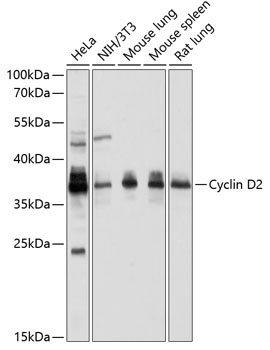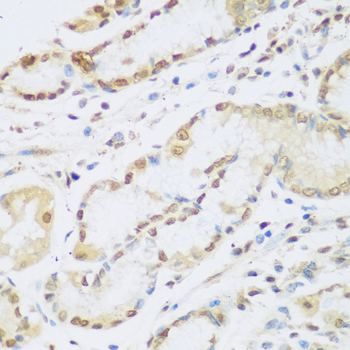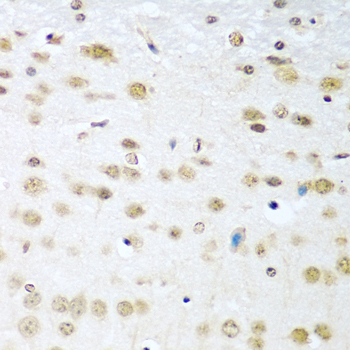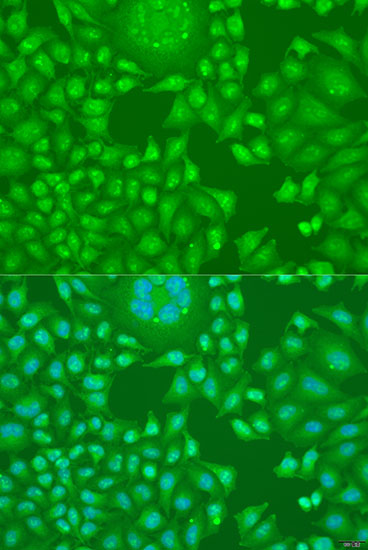Cell Cycle Antibodies 1
Anti-Cyclin D2 Antibody (CAB1773)
- SKU:
- CAB1773
- Product Type:
- Antibody
- Reactivity:
- Human
- Reactivity:
- Mouse
- Reactivity:
- Rat
- Host Species:
- Rabbit
- Isotype:
- IgG
- Antibody Type:
- Polyclonal Antibody
- Research Area:
- Cell Cycle
Description
| Antibody Name: | Anti-Cyclin D2 Antibody |
| Antibody SKU: | CAB1773 |
| Antibody Size: | 20uL, 50uL, 100uL |
| Application: | WB IHC IF |
| Reactivity: | Human, Mouse, Rat |
| Host Species: | Rabbit |
| Immunogen: | Recombinant fusion protein containing a sequence corresponding to amino acids 1-289 of human Cyclin D2 (NP_001750.1). |
| Application: | WB IHC IF |
| Recommended Dilution: | WB 1:500 - 1:2000 IHC 1:50 - 1:100 IF 1:50 - 1:100 |
| Reactivity: | Human, Mouse, Rat |
| Positive Samples: | HeLa, NIH/3T3, Mouse lung, Mouse spleen, Rat lung |
| Immunogen: | Recombinant fusion protein containing a sequence corresponding to amino acids 1-289 of human Cyclin D2 (NP_001750.1). |
| Purification Method: | Affinity purification |
| Storage Buffer: | Store at -20'C. Avoid freeze / thaw cycles. Buffer: PBS with 0.02% sodium azide, 50% glycerol, pH7.3. |
| Isotype: | IgG |
| Sequence: | MELL CHEV DPVR RAVR DRNL LRDD RVLQ NLLT IEER YLPQ CSYF KCVQ KDIQ PYMR RMVA TWML EVCE EQKC EEEV FPLA MNYL DRFL AGVP TPKS HLQL LGAV CMFL ASKL KETS PLTA EKLC IYTD NSIK PQEL LEWE LVVL GKLK WNLA AVTP HDFI EHIL RKLP QQRE KLSL IRKH AQTF IALC ATDF KFAM YPPS MIAT GSVG AAIC GLQQ DEEV SSLT CDAL TELL AKIT NTDV DCLK ACQE QIEA VLLN SLQQ YRQD QRDG SKSE DELD QAST PTDV RDID L |
| Gene ID: | 894 |
| Uniprot: | P30279 |
| Cellular Location: | Cytoplasm, Membrane, Nucleus |
| Calculated MW: | 24kDa/33kDa |
| Observed MW: | 37kDa |
| Synonyms: | CCND2, KIAK0002, MPPH3, cyclin D2, Cyclin D2 |
| Background: | The protein encoded by this gene belongs to the highly conserved cyclin family, whose members are characterized by a dramatic periodicity in protein abundance through the cell cycle. Cyclins function as regulators of CDK kinases. Different cyclins exhibit distinct expression and degradation patterns which contribute to the temporal coordination of each mitotic event. This cyclin forms a complex with CDK4 or CDK6 and functions as a regulatory subunit of the complex, whose activity is required for cell cycle G1/S transition. This protein has been shown to interact with and be involved in the phosphorylation of tumor suppressor protein Rb. Knockout studies of the homologous gene in mouse suggest the essential roles of this gene in ovarian granulosa and germ cell proliferation. High level expression of this gene was observed in ovarian and testicular tumors. Mutations in this gene are associated with megalencephaly-polymicrogyria-polydactyly-hydrocephalus syndrome 3 (MPPH3). |
| UniProt Protein Function: | CCND2: Regulatory component of the cyclin D2-CDK4 (DC) complex that phosphorylates and inhibits members of the retinoblastoma (RB) protein family including RB1 and regulates the cell-cycle during G(1)/S transition. Phosphorylation of RB1 allows dissociation of the transcription factor E2F from the RB/E2F complex and the subsequent transcription of E2F target genes which are responsible for the progression through the G(1) phase. Hypophosphorylates RB1 in early G(1) phase. Cyclin D-CDK4 complexes are major integrators of various mitogenenic and antimitogenic signals. Also substrate for SMAD3, phosphorylating SMAD3 in a cell-cycle-dependent manner and repressing its transcriptional activity. Component of the ternary complex, cyclin D2/CDK4/p27Kip1, required for nuclear translocation and activity of the cyclin D-CDK4 complex. Interacts with either CDK4 or CDK6 protein kinase to form a serine/threonine kinase holoenzyme complex. The cyclin subunit imparts substrate specificity to the complex. Component of the ternary complex cyclin D/CDK4/p27Kip1 required for nuclear translocation and modulation of CDK4-mediated kinase activity. Belongs to the cyclin family. Cyclin D subfamily. |
| UniProt Protein Details: | Protein type:Motility/polarity/chemotaxis; Cell cycle regulation Chromosomal Location of Human Ortholog: 12p13 Cellular Component: chromatin; cyclin-dependent protein kinase holoenzyme complex; cytosol; nuclear membrane; nucleolus; nucleoplasm; nucleus Molecular Function:protein binding; protein kinase binding Biological Process: positive regulation of cyclin-dependent protein kinase activity; positive regulation of protein amino acid phosphorylation Disease: Megalencephaly-polymicrogyria-polydactyly-hydrocephalus Syndrome 3 |
| NCBI Summary: | The protein encoded by this gene belongs to the highly conserved cyclin family, whose members are characterized by a dramatic periodicity in protein abundance through the cell cycle. Cyclins function as regulators of CDK kinases. Different cyclins exhibit distinct expression and degradation patterns which contribute to the temporal coordination of each mitotic event. This cyclin forms a complex with CDK4 or CDK6 and functions as a regulatory subunit of the complex, whose activity is required for cell cycle G1/S transition. This protein has been shown to interact with and be involved in the phosphorylation of tumor suppressor protein Rb. Knockout studies of the homologous gene in mouse suggest the essential roles of this gene in ovarian granulosa and germ cell proliferation. High level expression of this gene was observed in ovarian and testicular tumors. Mutations in this gene are associated with megalencephaly-polymicrogyria-polydactyly-hydrocephalus syndrome 3 (MPPH3). [provided by RefSeq, Sep 2014] |
| UniProt Code: | P30279 |
| NCBI GenInfo Identifier: | 231741 |
| NCBI Gene ID: | 894 |
| NCBI Accession: | P30279.1 |
| UniProt Secondary Accession: | P30279,Q13955, Q5U035, A8K531, |
| UniProt Related Accession: | P30279 |
| Molecular Weight: | 24,461 Da |
| NCBI Full Name: | G1/S-specific cyclin-D2 |
| NCBI Synonym Full Names: | cyclin D2 |
| NCBI Official Symbol: | CCND2 |
| NCBI Official Synonym Symbols: | MPPH3; KIAK0002 |
| NCBI Protein Information: | G1/S-specific cyclin-D2 |
| UniProt Protein Name: | G1/S-specific cyclin-D2 |
| Protein Family: | G1/S-specific cyclin |
| UniProt Gene Name: | CCND2 |
| UniProt Entry Name: | CCND2_HUMAN |
View AllClose










